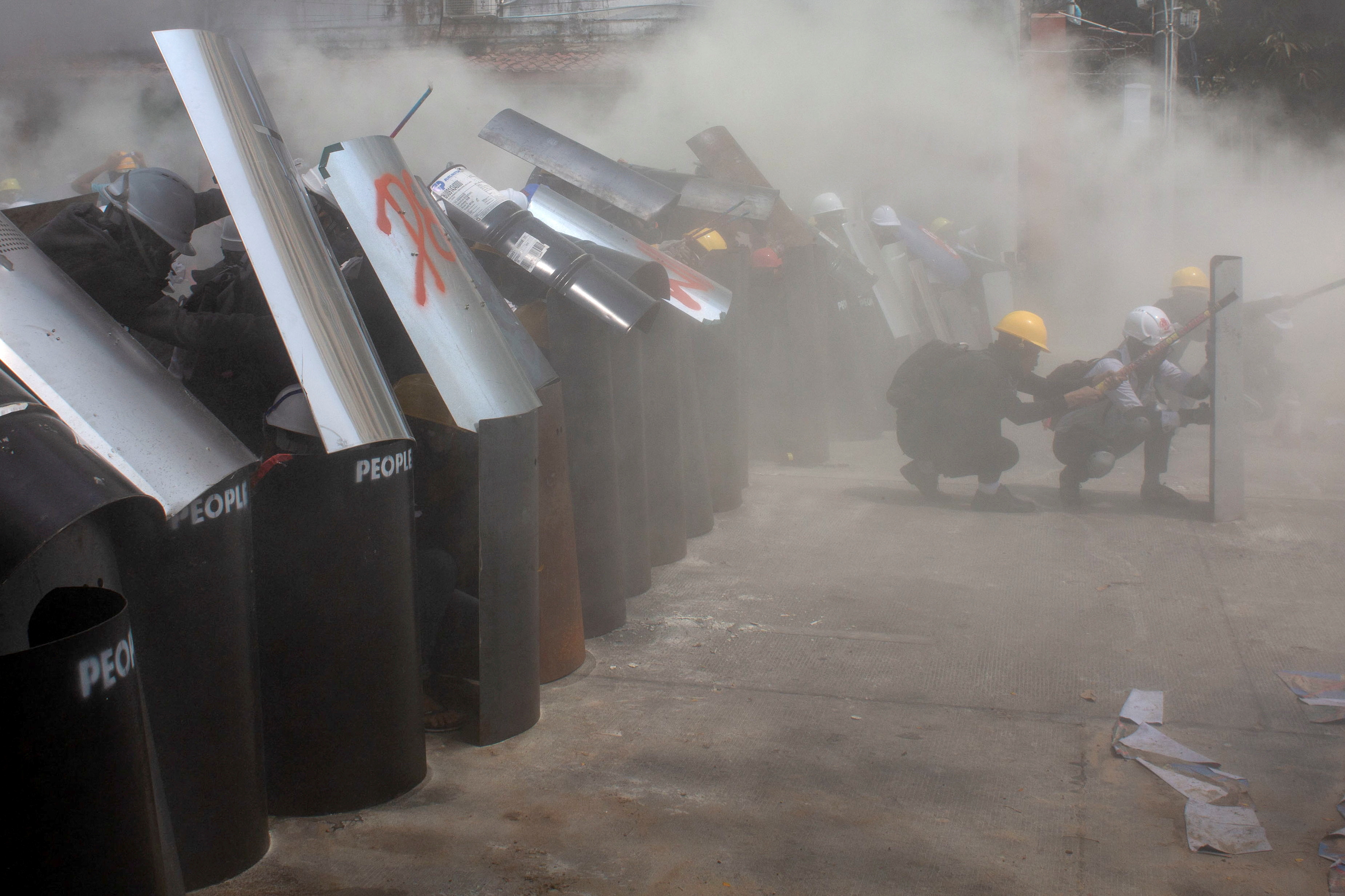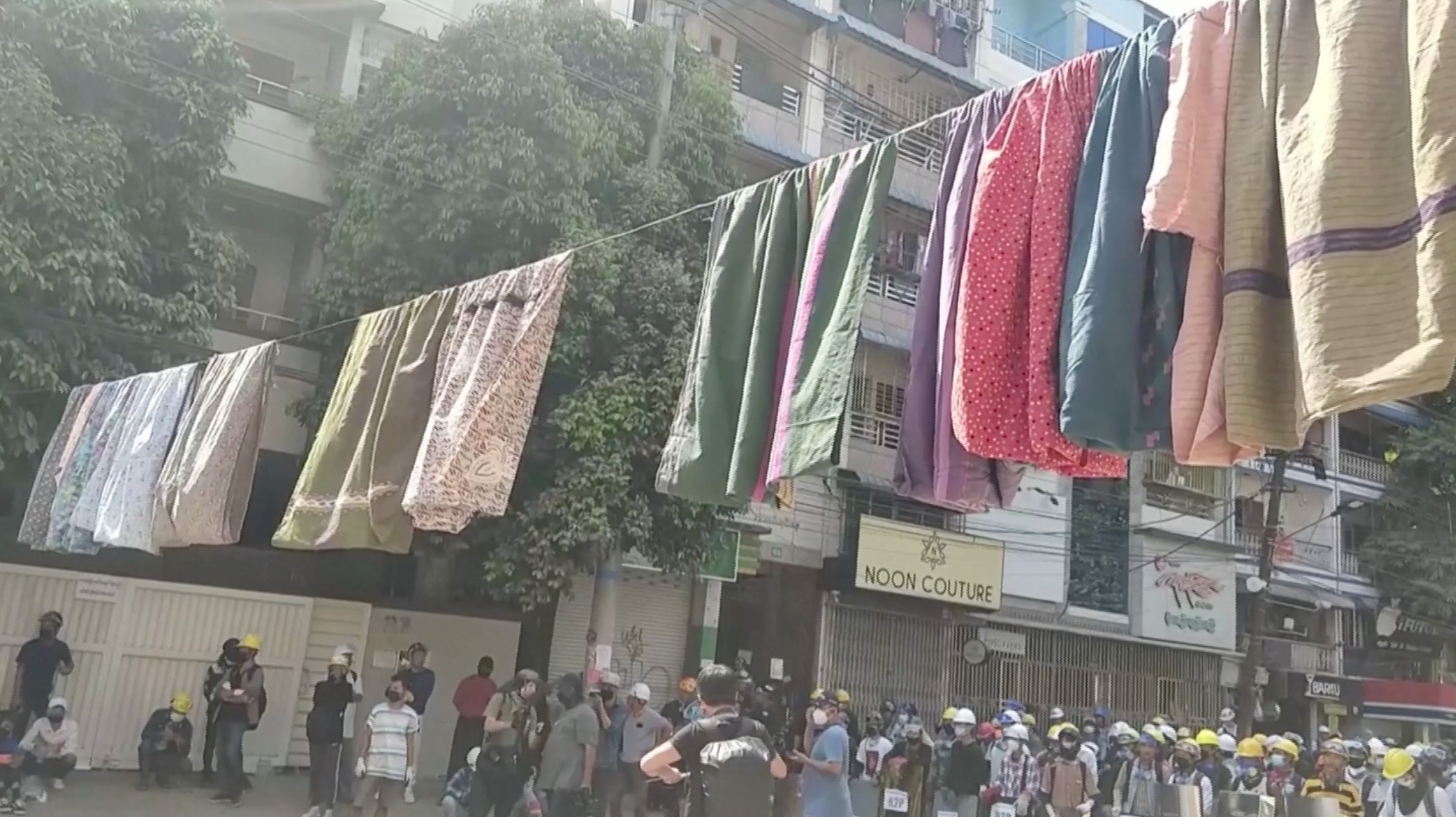Myanmar forces fire tear gas, stun grenades on protest as UN envoy calls for action

Protesters cover with makeshift shields during an anti-coup protest in Yangon, Myanmar, March 3, 2021. REUTERS/Stringer
Myanmar security forces used tear gas and stun grenades to break up a protest in Yangon on Saturday, just hours after a United Nations special envoy called on the Security Council to take action against the ruling junta for the killings of protesters.
The Southeast Asian country has been plunged in turmoil since the military overthrew and detained elected leader Aung San Suu Kyi on Feb. 1, with daily protests and strikes that have choked business and paralysed administration.
Sporadic protests were staged across Myanmar on Saturday and local media reported that police fired tear gas shells and stun grenades to break up a protest in the Sanchaung district of Yangon, the country's biggest city. There were no reports of casualties.
More than 50 protesters have been killed since the coup, according to the United Nations - at least 38 on Wednesday alone. Protesters demand the release of Suu Kyi and the respect of November's election, which her party won in landslide, but which the army rejected.
"How much more can we allow the Myanmar military to get away with?" Special Envoy Christine Schraner Burgener told a closed meeting of the 15-member U.N. Security Council on Friday, according to a copy of her remarks reviewed by Reuters.
"It is critical that this council is resolute and coherent in putting the security forces on notice and standing with the people of Myanmar firmly, in support of the clear November election results."
A junta spokesman did not answer calls requesting comment.
The army says it has been restrained in stopping the protests, but has said it will not allow them to threaten stability.
Several hundred people gathered in Sydney on Saturday to protest against the coup, singing and holding up three fingers, a salute that has come to symbolise solidarity and resistance across Myanmar.
"We would like to urge the Australian government to work closely with the U.S., UK and EU governments and take strong action against these Myanmar military dictators," said protest organiser Thein Moe Win. read more
In Myanmar's southern town of Dawei, protesters chanted "Democracy is our cause" and "The revolution must prevail".
People have taken to Myanmar's streets in their hundreds of thousands at times, vowing to continue action in a country that spent nearly half a century under military rule until democratic reforms in 2011 that were cut short by the coup.
"Political hope has begun to shine. We can't lose the momentum of the revolution," one protest leader, Ei Thinzar Maung, wrote on Facebook. "Those who dare to fight will have victory. We deserve victory."
GRAVE DISTURBED
On Friday night, authorities disturbed the grave of a 19-year-old woman who became an icon of the protest movement after she was shot dead wearing a T-shirt that read "Everything will be OK", a witness and local media said.
One witness said the body of Kyal Sin, widely known as Angel, was removed on Friday, examined and returned, before the tomb was re-sealed in Myanmar's second city of Mandalay. The independent Mizzima news service also reported the event.
A military spokesman did not answer calls seeking comment. Reuters was unable to contact police for comment. read more
The killing of protesters has drawn international outrage.
"Use of violence against the people of Myanmar must stop now," South Korean President Moon Jae-in said in a tweet, calling for the release of Suu Kyi and other detainees and for the restoration of democracy.
The United States and some other Western countries have imposed limited sanctions on the junta and the independent U.N. human rights investigator on Myanmar, Thomas Andrews, has called for a global arms embargo and targeted economic sanctions.
The army took power over allegations of fraud in last year's election which had been dismissed by the electoral commission. It has promised to hold a new election at an unspecified date.
That plan is rejected by protesters and by a group representing lawmakers elected at the last election that has begun to issue statements in the name of a rival civilian administration.
On Friday, it listed four demands - the end of the junta, the release of the detainees, democracy and the abolition of the 2008 constitution which left significant political representation and control in the hands of the military.
A civil disobedience campaign of strikes running parallel with the protests has been supported by many government workers including a trickle of policemen.
Authorities in Myanmar have asked India to return eight policemen who sought refuge across the border to avoid taking orders from the junta, an official in northeast India said on Saturday.
India's foreign ministry responded to a request for comment by referring to a statement given at a media briefing on Friday which said the ministry was still "ascertaining the facts." read more

Myanmar protesters string up women's clothes for protection
Protesters in Myanmar have taken to stringing up women's clothing on lines across the streets to slow down police and soldiers because walking beneath them is traditionally considered bad luck for men.
The wraparound cloths, known as longyi, are hung on washing lines. Sometimes women's underwear is used too.
"The reason why we hang the longyis across the streets is that we have the traditional belief that if we pass underneath a longyi, we might lose our luck," said one 20-year-old protester who declined to give his name for fear of reprisals.
"The younger generation nowadays doesn't believe it anymore, but the soldiers still do, and it's their weakness. So, we might gain more time to run if they come towards us in case of emergency."
Videos on social media have shown police taking down the lines of clothes before crossing them. Traditionally walking beneath items used to cover women's private parts is not only bad luck, but emasculating for men.
Reuters was unable to contact police for comment.
For more than one month, protesters have demonstrated across Myanmar against the Feb. 1 military coup and the arrest of elected leader Aung San Suu Kyi and hundreds of others. More than 50 protesters have been killed by security forces.
The lines of clothing do not stop police using teargas, rubber bullets and stun grenades. Some protesters have also been killed by live bullets. The army has said it has responded to the protests with restraint.
The army seized power alleging fraud in a November election won by Suu Kyi's party. The electoral commission had dismissed its allegations.
No comments:
Post a Comment